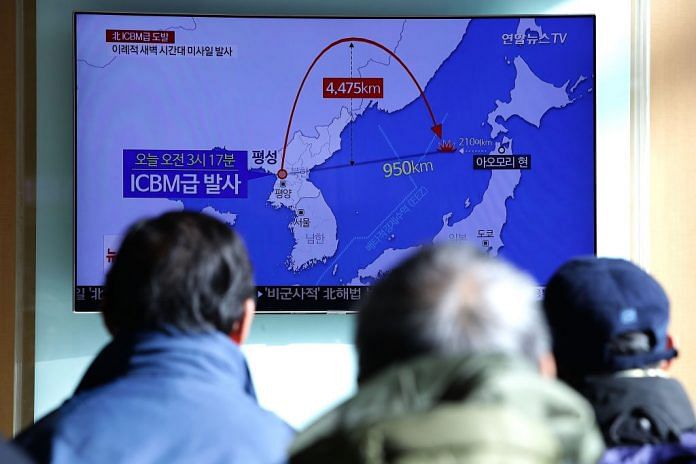Are Americans complacent about the possibility of war with North Korea? Could the Pyongyang regime be angling for a diplomatic path through its latest aggression? Is a nuclear armed South Korea the only solution? A week after putting the country back on America’s list of state sponsors of terrorism, North Korea’s latest missile launch leaves the international community lost in a diplomatic maze.
Is Kim angling for a diplomatic path?
When North Korea launched a missile in the small hours of 29 November, which appeared to have the range to strike any city in America, there was a silver lining. The rhetoric accompanying the launch was relatively muted, writes The Economist.
“Mr Kim eschewed the extravagantly bellicose rhetoric he normally indulges in after a successful missile launch. His ‘solemn declaration’ emphasised that North Korea would be a ‘responsible nuclear power’ that ‘would not pose any threat to any country and region’ as long as the interests of North Korea ‘are not infringed upon’. It sounded like a plea for North Korea to be respected as a nuclear state, not vilified as a pariah.”
“Nobody really believes that there is a diplomatic path that will lead Mr Kim to give up his nuclear weapons. But diplomacy may yet play a role in crisis management and thus lessen the risks of a disastrous miscalculation. That may be what Mr Kim is now angling for.”
The planet’s first nuclear exchange
“If there was a message in North Korea’s launch of a new missile capable of reaching anywhere in the United States, it was that America’s strategy toward that country is failing — and that war may be looming,” writes Nicholas Kristof in The New York Times.
Yes, Trump has said new sanctions are in the works, but with enormous economic pressure already existing on Pyongyang, it remains to be seen what these new sanctions could do. “Our strategy of economic sanctions is ineffective against an isolated regime that earlier accepted the death by famine of perhaps 10 percent of its population,” he writes.
As of the possibility of war, “The American public is far too complacent about the possibility of a war with North Korea, one that could be incomparably bloodier than any U.S. war in my lifetime. One assessment suggests that one million people could die on the first day.”
“Some analysts believe in retrospect that it would have made sense for the U.S. to have attacked North Korea’s nuclear sites just as it was beginning its program, in the late 1980s. But even then, North Korea had the capacity to rain chemical and biological weapons on Seoul.”
“So let’s try talking, rather than risk the first exchange of nuclear weapons in the history of our planet.”
Time for Japan and South Korea to go the nuclear way
North Korea has tested a ballistic missile— and while Trump’s response has been somewhat muted, one doesn’t have to take the aggression lying and let the status quo remain, writes Doug Bandow in The Japan Times.
“Pyongyang’s acquisition of a nuclear arsenal is an appropriate time to consider encouraging nations threatened by the North, most obviously South Korea and Japan, to develop countervailing deterrents. Seoul started down the nuclear path a half century ago before being forced to halt by U.S. pressure. Today the South Korean public wants to finish that journey,” Bandow says.
“That would force Japanese policymakers and people to consider doing the same to confront growing challenges from the North and China. Beijing then might feel forced to do more to constrain the North’s nuclear ambitions to forestall America’s friends going nuclear.”
“Stepping back militarily and allowing prosperous and populous states to take over their own defense surely is better than starting the very war Washington has spent 64 years attempting to prevent.”
Thank God for Trump, said every bigot ever
While Trump is caught in a serious problem with North Koreas, he’s also busy creating problems where there are none: on Twitter. Why would a US president randomly retweets three Twitter posts promoting anti-Muslim videos? According to the White House, the Washington Post editorializes, the veracity of his tweets don’t matter.
“Mr. Trump’s tweets are often absurd and demeaning — both to the targets of his abuse and to those who must ritually respond to the latest instance of unpresidential conduct. The president is skilled at using his Twitter account to sow confusion and anger. But we cannot ignore that some behavior is simply beyond the pale. The office of British Prime Minister Theresa May said it best: ‘It is wrong for the president to have done this’.”
“The threat in question is posed not by an imagined Muslim menace but by far-right and anti-Muslim ideology. FBI data shows that hate crimes against Muslims have risen sharply for the past two years in a row, reaching their highest level since the 9/11 aftermath. And Mr. Trump’s promotion of vicious propaganda risks encouraging further violence and emboldening those who seek to drum up hate. That includes figures such as former Ku Klux Klan leader David Duke, who crowed over Mr. Trump’s refusal to condemn far-right violence in Charlottesville and wrote in response to the president’s Wednesday tweets, ‘Thank God for Trump’!”



